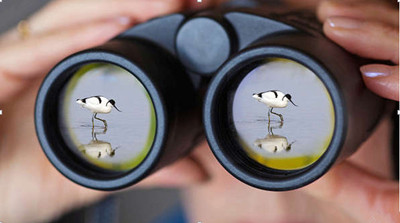鸟类观察
All aflutter
群情激动
Britain's largest conservation society is ruffling feathers
英国最大的鸟类保护组织现在面临着成员流失的危险。
ON January 24th and 25th around half a million people were expected to take part in the “big garden birdwatch”, an annual event run by the Royal Society for the Protection of Birds (RSPB). Since 1979, when the event began, people have peered into their gardens to spot feathered creatures and log their sightings in a centralised database. But as well as looking out for wrens, collared doves and blackcaps, this year, for the second time, they are being encouraged to spot squirrels, badgers, deer and even worms.
一年一度的“大花园鸟类调查活动”今年于1月24,25号由英国皇家鸟类保护协会继续举办,此次活动的参与人数达到了50万人。从1979年开始,每当这项活动开始时,人们凝视着那些带羽毛的生物,并将记录的数据汇总到协会管理的数据库中。但是今年人们除了观测鹪鹩,信鸽以及莺类这样的常见鸟类之外,协会再次鼓励人们去观察和记录像松鼠,獾,鹿甚至是蠕虫这样的生物。

Since the RSPB was started in 1889 by a group of women worried about the use of feathers in hats, its remit has widened. The charity now runs 212 nature reserves and lobbies the government about broad issues such as climate change and renewable energy. It has also started to emphasise that its main focus is far broader than just birds. In 2013 a TV advert showed a young girl watching for frogs and hedgehogs in her garden; the same year the RSPB magazine Birds was rebranded Nature's Home. People expect all of Nature to be connected, says Mike Clarke, the RSPB's chief executive. “If you go on about birds,” he adds, “you become associated with a bird-watching club.”
1889年由一群妇女建立的英国皇家鸟类保护协会,其初衷是担忧在帽子上大量装饰鸟的羽毛会影响鸟类的生存。但自成立之日起,该协会涉足的领域一直在扩大。该协会现在运营着212个自然保护区。同时,还就诸如气候变化以及可再生能源这样的问题不断跟政府进行交涉。协会自身也已经开始强调,他们的关注点远不只是鸟类。2013年,该协会在电视上登出广告主题是一个小女孩在仔细观察她家花园中青蛙和刺猬,同年,协会自办杂志《鸟类》更名为《自然之家》。 人们期望的是关注所有跟自然界相关的事物,协会理事长 Mike Clarke表示“如果我们继续只专注于鸟类,那我们和一家观鸟俱乐部有什么区别?”
Despite its popularity, bird-watching has a “slightly geeky reputation” ventures Kevin Cox of Devon Birds, a local birding society. Nature programmes presented by men wearing khaki shorts and tight-fitting T-shirts make searching for frogs and the like seem rather more glamorous. Having grown quickly during the 1990s, membership of the RSPB began to slow later; it even fell slightly between 2011 and 2013. The recession may have squeezed some birders. But membership numbers at other organisations such as the Wildlife Trusts and the British Trust for Ornithology have continued to rise, albeit from a smaller base. The Wildlife Trusts, an umbrella organisation of 47 different wildlife organisations, has over 800,000 members. “Back in the day, the RSPB was it,” recalls Martin Garner, a birder. Now there is strong competition.
尽管该活动名声远扬,但是一个叫‘Kevin Cox of Devon Birds'的地区观鸟团体让这次盛会有了一点“小污名”。一群穿着卡其色短裤和紧身T恤的男人搜索着像青蛙这样的动物—这样一档自然节目看上去好像更吸引眼球。而该协会的成员从20世纪90年代起开始急速增长,相对的,RSPB成员的增长速度开始变缓;在2011年至2013年期间甚至有轻微地下滑。之前的经济危机对于观鸟者的人数也有一定程度的影响。但是其它类似的小型机构—Wildlife Trusts 和 British Trust for Ornithology的成员人数却是保持增长的。Wildlife Trusts是一家涵括了47种野生动物的保护组织,现在已经拥有了超过80万名成员。观鸟者Martin Garner表示“放在过去,RSPB一家独大,但是现在竞争非常激烈。”
The RSPB's strategy, along with a more active marketing campaign, seems to be working. Between 2013 and 2014 membership numbers increased by 3% and exceeded 1.1m for the first time. And the RSPB's membership is changing. Families accounted for 15% of all members in 2007, but now make up 30%.
RSPB的对策则是进行一系列有吸引力的市场营销活动—看上去似乎也起到了作用。2013年至2014年期间,成员数量增加了3%,首次突破了110万人。与此同时,成员的组成结构也在发生变化。2007年家庭成员占据了15%的会员数,但现在这一数据达到了30%。
Some worry that, by broadening its appeal beyond birds, the campaigning mission of the charity as set out by its Victorian founders will be lost. It risks becoming “muzzled by its fear of losing members”, says Mark Cocker, an expert on birds and birders, perhaps preventing the charity from taking a hard political stance. It also risks alienating the most dedicated birders. Many enthusiasts are already turning to more specialist bird organisations that take “hands-on action” to help preserve wetlands or campaign against the hunting of rare species, says Steve Kirk of BirdForum, a website. Their migration may be more permanent than those of the creatures they track.
与此同时还存在着一些不可忽视的隐患,随着涉足领域的不断扩大,RSPB可能会渐渐偏离维多利亚时代的创始人的初衷。鸟类及观鸟者专家Mark Cocker认为,协会有因为“害怕失去会员而沉默”的风险,这可能会阻止协会继续维持坚定的政治立场。领域的不断扩大还可能有疏远那些专注于鸟类的会员的危险。BirdForum网的Steve Kirk 表示,很多热衷与此的人表示他们已经准备转投一些更加专注于鸟类保护的组织——这些组织更能采取一些“实际行动”来保护湿地以及进行反对猎杀珍惜品种的活动。比于他们所追踪的生物,可以说,鸟儿还有回来的时候,失去的成员不太可能回来了。候鸟尚有归来日,人去楼空不复还。译者:曾擎禹 校对:唐宇













